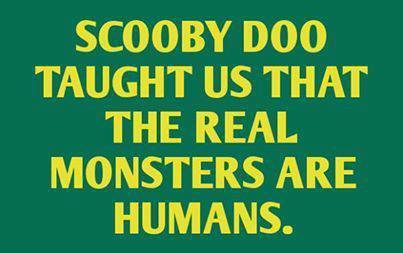Why I Am a Christian Humanist
Scooby Doo taught us that the real monsters are human.
Think of all the evil on earth, a good chunk of it can be credited to humans. Some of the most horrible things that have happened to you and me were invented by a human mind.

I recently finished My Story by Elizabeth Smart, a day-by-day account of the monotony of her life during the nine months of her kidnapping. Her kidnappers used false religion to justify their emotional, physical and sexual abuse. Smart was not taken in, she says, but her capacity to fight back was destroyed. Perhaps, we liked Smart’s story so passionately because the villains were so obvious. We knew when justice had been served.
More often, human have little idea of how much we are going to hurt each other. We participate in group evil in places that seem full of God’s blessing. How often the (false) church has been the handmaiden to manipulation, consumerism, extortion, false guilt, coerced service. Blaise Pascal wrote, “Men never do evil so completely and cheerfully as when they do it from religious conviction.”
My husband regularly writes and vlogs about the spiritual abuse of well-meaning, modern day Pharisees at FreeAtLast.me. One of my favorite examples of what he suffered, “Why did you stay at Pensacola Christian College?”
I see in my husband, Dale Fincher, a rare blend of tenderness with truth. Like a modern day prophet, Dale refuses to be harsh or vengeful as he critiques the systems of thought that kept him from Jesus’ living water even while claiming to be the one true church. Others who attended his college chose another way. Some refuse to make a peep about anything negative (as if Jesus told his followers to always be positive–tell me, where is that written?). Others have chosen to leave the faith altogether. This first comment in Dale’s post “What is Spiritual Abuse?” is a perfect case in point “This is exactly what was done to me and 20 plus years later I still haven’t made it back to church….”
What kind of response can we give when humans (even in the church) behave like monsters? Does our Christian anthropology have more to say then, “Well, we’re all sinner, what do you expect?” Do we have some good news?
Coffee Shop Conversations in Beverly Hills
Last weekend, I attended a friend’s wedding in Beverly Hills. An Indian man and his girlfriend chose to sit by me. Coincidence? 
After a few minutes of conversation the man shared some of his reasons and summed up, ”That’s why I’m an atheist. I believe all religions should all just learn to get along.”
I told him I agreed with him. “I think we need better, more sustained civil discourse. But I’m a Christian humanist. And I’d imagine you’re a secular humanist, so this is one point we’ll agree.” He was nodding. I went on, “The main difference between you and me is you’re using spirituality to improve your positive energy, but I’ve fallen in love with God.”
He (and his girlfriend) knew precisely what I meant.
I’m not sure it was my best line, but I’m constantly trying to find new ways to talk about Jesus (more more see Coffee Shop Conversations).
People think they know Christians, and our Christ and our hypocritical, homo-phobic, judgmental, overly-political ways. And then they get a chance to meet one of us.
It’s not that Jesus is false or his people are failing as much as Jesus’ PR is failing.
And that needs to change.
Why I Am a Christian Humanist
That word “humanist” has easily been assigned to the atheist, but it doesn’t only belong to them. In fact, if you believe God created humans, then humanists could actually be God-fearers, too.
Christian humanism is neither secular or atheistic. Rather, it’s a way to talk about Jesus’ good news, without getting the instant dismissal and glazed eyes, a way to prolong our spiritual conversations and introduce others to our Savior.
Christian humanism couples the delight in this life with the assurance that God made us human on purpose. Human. Sexual. Sensual. Desire-Filled. Hungry. Thirsty. All on purpose.
Remember Jesus’ words, “Blessed are you who hunger and thirst for righteousness, for you shall be filled” (Matt 5:6). Jesus taught us to be more fully human, how to live as a human, how to die and rise as a human. He provided the example, but even more, he provides the power of God for salvation. And from what do we need to be saved?
From ourselves, from the monsters humans can become. Soulation is about helping people become more fully human, with the hungering and the thirsting for righteousness.

So, you might be wondering, just what is a Christian humanism? What ingredients make a Christian a humanist?
a person who is attached to orthodoxy while open to the world.
a person who believes in life before (and after) death.
a person who wants to assimilate scripture into culture, not reject or accommodate (either the Christian subculture or the world’s pop culture).
a person who is living with the paradox that life is tragic yet contains a persistent strain of hope.
a person who refuses to relinquish two vital ingredients of our intelligence: imagination and reason.
Dale introduced Christian humanism to me. I’m glad to say it has helped me hold onto my love for humans, my delight in the humanities, and my conviction that Jesus came to make me more fully myself.
What do you think of Christian Humanism? Does it ring true for you?
Jonalyn Fincher's Blog
- Jonalyn Fincher's profile
- 9 followers



